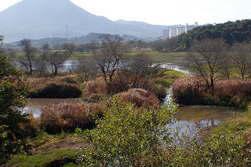 영어토론방 영어토론방 | Home>영어토론방 |
Geography Korea Decides to Report All Changes
페이지 정보

본문
 Korea Decides to Report All Changes Made in Wetlands to Next Convention in 2012
Korea Decides to Report All Changes Made in Wetlands to Next Convention in 2012 CHANGWON ㅡ A Korea government-led declaration envisioning a way of harmonizing humanity and nature was adopted at the close of the Ramsar Convention, Tuesday, setting five themes in conserving the world's wetlands.
The ``Changwon Declaration'' highlights positive action for ensuring human well-being and security in the future under the themes ㅡ water, climate change, people's livelihood and health, land use change, and biodiversity, Korean delegates said.
``The declaration is different from other issues discussed during the session as it offers practical measures and ways to assure it will have an impact,'' a delegate said.
Ahead of the convention's closing, Korea's two ministries responsible for wetland conservation ㅡ the Ministry of Land, Transport and Maritimes Affairs and the Ministry of Environment ㅡ reached a consensus to report changes made over the next three years in 20 ``Wetland Protection Areas'' and 32 ``Ecosystem Landscape Conservation Areas'' in Korea at the next Ramsar Convention to be held in Rumania in 2012.
The changes include any development projects, withdrawal of designation, and many others, a land ministry official Shin Jae-young said.
This was initiated in response to requests from NGOs here, making Korea the first among the contracting parties of the convention to take such a bold measure.
The reports will function as a watchdog for the preservation of more than 604 square kilometers of so-called endangered areas, ranging from western coastal tidal flatlands to small wetlands in mountainous areas.
During a press conference to wrap up the meeting, Environment Minister Lee Maan-ee said it was confirmed that the first Ramsar Research Center covering the East Asian region will be built in Korea and Changwon, the host city for the convention, will be the most likely location.
He added the ministry will closely work with the United Nations Environment Program (UNEP) and the International Union for Conservation of Nature (IUCN) to host the IUCN Congress and declare the Demilitarized Zone as an eco-park.
Of 33 draft resolutions discussed during the eight-day session, 32 were adopted while one regarding the frequency of meetings was rejected.
Among those approved was a joint draft resolution by the Korean and Japanese governments to get rice paddies eligible for recognition as Ramsar-listed wetlands. The draft had faced complaints from countries whose staple food is not rice, but won approval at the last minute thanks to support from Asian countries.
The resolution states that more than 100 designated Ramsar sites around the world include rice-filled habitats and play important ecological roles and support a range of biodiversity, including internationally important populations of breeding and non-breeding resident and migratory birds.
``It's meaningful that the Changwon Declaration, which envisions a way for us to harmonize with nature, and the resolution on rice paddies, were adopted,'' the minister said.
Anada Tiega, secretary general of the Ramsar Convention Secretariat, said, ``The most meaningful achievement is that many Koreans are now better aware of the importance of wetlands conservation.'' He also pledged to support facilitating the rice paddies resolution.
South Gyeongsang Province Governor Kim Tae-ho said, ``Changwon will transform itself into a Mecca for eco-tourism following the meeting and strive to become a center for environmental business.''
According to the convention administration, more than 2,288 government officials and environmental activists from 140 countries took part in the general meeting and dozens of side events. More than 454,000 citizens are estimated to have visited Ramsar-listed wetlands in the vicinity of the convention building during the seven-day session, it said.
By Park Si-soo
Staff Reporter
pss@koreatimes.co.kr
이 글은「대학연합영어토론동아리」www.pioneerclub.com에서 제공하는 영어토론 정보입니다.
댓글목록
등록된 댓글이 없습니다.

